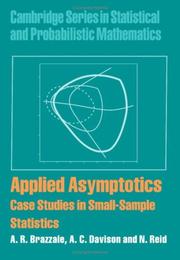| Listing 1 - 2 of 2 |
Sort by
|

ISBN: 9780521847032 0521847036 9780511611131 9780511286704 0511286708 0511284403 9780511284403 0511285221 9780511285226 0511285981 9780511285981 0511611137 1107175615 1280909897 9786610909896 0511322224 Year: 2007 Publisher: Cambridge Cambridge University Press
Abstract | Keywords | Export | Availability | Bookmark
 Loading...
Loading...Choose an application
- Reference Manager
- EndNote
- RefWorks (Direct export to RefWorks)
In fields such as biology, medical sciences, sociology, and economics researchers often face the situation where the number of available observations, or the amount of available information, is sufficiently small that approximations based on the normal distribution may be unreliable. Theoretical work over the last quarter-century has led to new likelihood-based methods that lead to very accurate approximations in finite samples, but this work has had limited impact on statistical practice. This book illustrates by means of realistic examples and case studies how to use the new theory, and investigates how and when it makes a difference to the resulting inference. The treatment is oriented towards practice and comes with code in the R language (available from the web) which enables the methods to be applied in a range of situations of interest to practitioners. The analysis includes some comparisons of higher order likelihood inference with bootstrap or Bayesian methods.
Statistical hypothesis testing --- Asymptotic theory. --- Mathematics. --- Math --- Science --- Asymptotic theory in statistical hypothesis testing --- Asymptotic expansions
Book
ISBN: 3662543230 3662543222 Year: 2017 Publisher: Berlin, Heidelberg : Springer Berlin Heidelberg : Imprint: Springer,
Abstract | Keywords | Export | Availability | Bookmark
 Loading...
Loading...Choose an application
- Reference Manager
- EndNote
- RefWorks (Direct export to RefWorks)
Presenting tools to aid understanding of asymptotic theory and weakly dependent processes, this book is devoted to inequalities and limit theorems for sequences of random variables that are strongly mixing in the sense of Rosenblatt, or absolutely regular. The first chapter introduces covariance inequalities under strong mixing or absolute regularity. These covariance inequalities are applied in Chapters 2, 3 and 4 to moment inequalities, rates of convergence in the strong law, and central limit theorems. Chapter 5 concerns coupling. In Chapter 6 new deviation inequalities and new moment inequalities for partial sums via the coupling lemmas of Chapter 5 are derived and applied to the bounded law of the iterated logarithm. Chapters 7 and 8 deal with the theory of empirical processes under weak dependence. Lastly, Chapter 9 describes links between ergodicity, return times and rates of mixing in the case of irreducible Markov chains. Each chapter ends with a set of exercises. The book is an updated and extended translation of the French edition entitled "Théorie asymptotique des processus aléatoires faiblement dépendants" (Springer, 2000). It will be useful for students and researchers in mathematical statistics, econometrics, probability theory and dynamical systems who are interested in weakly dependent processes.
Statistical hypothesis testing --- Asymptotic theory. --- Asymptotic theory in statistical hypothesis testing --- Mathematics. --- Dynamics. --- Ergodic theory. --- Game theory. --- Probabilities. --- Probability Theory and Stochastic Processes. --- Dynamical Systems and Ergodic Theory. --- Game Theory, Economics, Social and Behav. Sciences. --- Asymptotic expansions --- Distribution (Probability theory. --- Differentiable dynamical systems. --- Math --- Science --- Differential dynamical systems --- Dynamical systems, Differentiable --- Dynamics, Differentiable --- Differential equations --- Global analysis (Mathematics) --- Topological dynamics --- Distribution functions --- Frequency distribution --- Characteristic functions --- Probabilities --- Games, Theory of --- Theory of games --- Mathematical models --- Mathematics --- Ergodic transformations --- Continuous groups --- Mathematical physics --- Measure theory --- Transformations (Mathematics) --- Dynamical systems --- Kinetics --- Mechanics, Analytic --- Force and energy --- Mechanics --- Physics --- Statics --- Probability --- Statistical inference --- Combinations --- Chance --- Least squares --- Mathematical statistics --- Risk
| Listing 1 - 2 of 2 |
Sort by
|

 Search
Search Feedback
Feedback About UniCat
About UniCat  Help
Help News
News